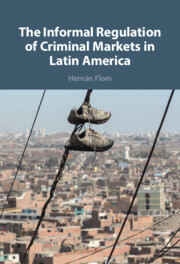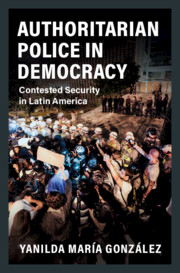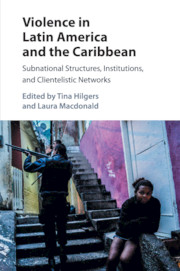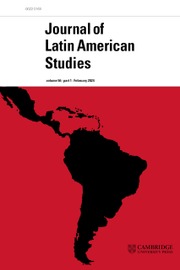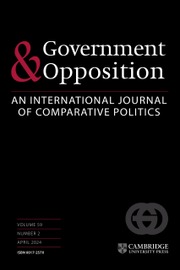The Informal Regulation of Criminal Markets in Latin America
£75.00
- Author: Hernán Flom, Trinity College, Connecticut
- Date Published: August 2022
- availability: Available
- format: Hardback
- isbn: 9781009170727
£
75.00
Hardback
Other available formats:
Paperback, eBook
Looking for an inspection copy?
This title is not currently available on inspection
-
This book explains how states informally regulate drug markets in Latin America. It shows how and why state actors, specifically police and politicians, confront, negotiate with, or protect drug dealers to extract illicit rents or prevent criminal violence. The book highlights how, in countries with weak institutions, police act as interlocutors between criminals and politicians. It shows that whether and how politicians control their police forces explains the prevalence of different informal regulatory arrangements to control drug markets. Using detailed case studies built on 180 interviews in four cities in Argentina and Brazil, the book reconstructs how these informal regulatory arrangements emerged and changed over time.
Read more- Introduces a theoretical framework to explain state responses to illicit markets
- Develops a topic that appeals to scholars and policymakers
- Engages an interdisciplinary audience through theory, case studies and practical implications
Reviews & endorsements
'We long suspected that state actors in Argentina and Brazil were deeply involved in illicit narcotics markets and that this involvement was producing the interpersonal violence that periodically shakes these countries. But we didn't know how state intervention, drug trafficking, and violence intersect and interact. This book systematically dissects this relation and offers a novel and insightful perspective to understand and explain one of the most intractable issues in contemporary Latin America. Superbly written and brilliantly argued, the plethora of scholarly and policy lessons packed in this book will make it an unavoidable reference in the study of contemporary Latin America.' Javier Auyero, Joe R. and Teresa Lozano Long Professor in Latin American Sociology, University of Texas-Austin, author of The Ambivalent State: Police-Criminal Collusion at the Urban Margins
See more reviews'When and how do illicit markets come to be jointly governed by states and organized crime? Hernán Flom unpacks how relations between politicians, police, and criminals generate informal regulatory arrangements that shape state and criminal violence associated with drug markets in Latin America. Insightful theorization and rich empirics make this book an important contribution to the growing research on the politics of crime.' Eduardo Moncada, Assistant Professor of Political Science, Barnard College, Columbia University and author of Resisting Extortion: Victims, Criminals, and States in Latin America (Cambridge University Press, 2021)
'This path-breaking book explains how politics in weakly institutionalized democracies shape the ways in which state authorities and the police informally regulate illicit drug markets. Theoretically insightful and empirically rich, Flom's study of four metropolitan areas in Argentina and Brazil masterfully weaves the voices of hundreds of cops and politicians into a cogent explanation of the different uses of violence and corruption to govern illicit markets in the Global South. The book is essential reading for students of governance, regulation, illicit economies, crime, and the police.' Guillermo Trejo, Professor of Political Science, University of Notre Dame
'Hernán Flom studies rigorously the relationship between elected politicians and police to explain diverse informal regulatory regimes of drug markets in Argentina and Brazil. This book contributes to theorizing the multiple, and often unexpected, ways in which states interact with drug markets, not only repressing them or enforcing the law, but also tolerating, preying upon, or protecting them. His focus on the police as a pivotal actor expands our knowledge of the intricate dynamics that connect states and criminal markets. The book is an important addition to the literature on criminal violence, drug markets, and policing.' Angélica Durán-Martínez, Associate Professor of Political Science, Director of Global Studies Ph.D. Program, The University of Massachusetts Lowell
Customer reviews
Not yet reviewed
Be the first to review
Review was not posted due to profanity
×Product details
- Date Published: August 2022
- format: Hardback
- isbn: 9781009170727
- length: 300 pages
- dimensions: 235 x 157 x 22 mm
- weight: 0.56kg
- availability: Available
Table of Contents
1. Informal regulation of criminal markets in Latin America
2. A theory of drug market regulation
3. Particularistic confrontation: The persistent war between gangs and police in Rio De Janeiro
4. Particularistic negotiation: The decentralization of police corruption and increase in violence in Rosario, Santa Fe
5. Coordinated protection: The consolidation of centralized corruption in Buenos Aires
6. Coordinated coexistence: The consolidation of a police-gang truce in São Paulo
7. Regulation of criminal markets in weak institutional contexts.
Sorry, this resource is locked
Please register or sign in to request access. If you are having problems accessing these resources please email [email protected]
Register Sign in» Proceed
You are now leaving the Cambridge University Press website. Your eBook purchase and download will be completed by our partner www.ebooks.com. Please see the permission section of the www.ebooks.com catalogue page for details of the print & copy limits on our eBooks.
Continue ×Are you sure you want to delete your account?
This cannot be undone.
Thank you for your feedback which will help us improve our service.
If you requested a response, we will make sure to get back to you shortly.
×
